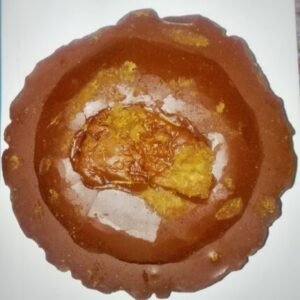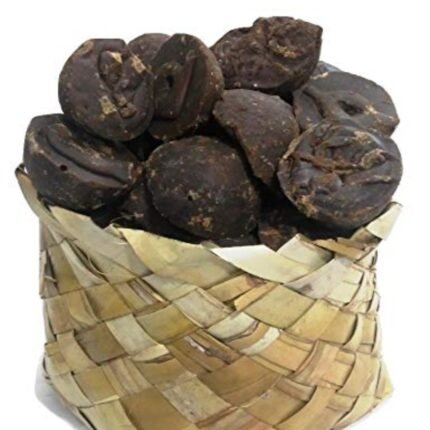Medically reviewed by Dr. Ramesh Gaddam, M.D. — Written by Sumalatha, D.N.H.E
Palm jaggery, also known as palm sugar or gur, is a natural sweetener that is produced from the sap of various species of palm trees. The sap is extracted by tapping the flower buds of the palm tree, and then it is concentrated to form a thick, dark brown, concentrated product. This process is common in regions where palm trees are abundant, such as in parts of Southeast Asia, Africa, and South America.
Nutrition of Palm Jaggery
Nutrition in 100 grams of palm jaggery:
| Nutrient | Amount per 100g |
|---|---|
| Energy | 383-400 calories |
| Carbohydrates | 97-98 grams |
| Sugars | 76-80 grams |
| Protein | 0.4-1 gram |
| Fat | 0.4-0.6 grams |
| Dietary Fiber | 0.2-0.6 grams |
| Iron | 4-5 milligrams |
| Calcium | 30-50 milligrams |
| Potassium | 170-250 milligrams |
| Sodium | 9-12 milligrams |
| Vitamin C | 1-2 milligrams |
| Vitamin B complex | Varies |
Types of Palm Jaggery
Different types of palm jaggery can be produced depending on the type of palm tree, the region, and the processing methods. Here are some of the common types of palm jaggery:

Date Palm Jaggery:
Made from the sap of date palm trees, this type of palm jaggery is commonly found in Middle Eastern and North African cuisines. It has a distinctive caramel flavor and is often used in sweets and desserts.
Palmyra Palm Jaggery:
Derived from the palmyra palm, also known as the “ice apple” tree, this jaggery is popular in South and Southeast Asian countries. It is often used in traditional dishes and sweets.
Coconut Palm Jaggery:
Produced from the sap of coconut palm trees, coconut palm jaggery is widely used in South Asian and Southeast Asian cuisines. It has a unique flavor and is a common sweetener in various recipes.
Arenga Palm Jaggery:
Made from the sap of the arenga pinnata palm, this type of jaggery is found in Southeast Asian countries such as Indonesia. It is known for its dark color and rich, smoky flavor.
Toddy Palm Jaggery:
Extracted from the sap of the toddy palm tree, this jaggery is used in South Asian and Southeast Asian cuisines. It is known for its sweet and earthy taste.
Kitul Palm Jaggery:
Produced from the sap of the kitul palm, which is native to Sri Lanka, this type of jaggery is used in Sri Lankan cuisine. It has a unique flavor and is often used in sweets and desserts.
Benefits of Palm Jaggery
Palm jaggery, a natural sweetener derived from the sap of palm trees, offers several health benefits due to its nutritional content and lower processing compared to refined sugar.
Here are some of the potential benefits of consuming palm jaggery:
Rich in Nutrients:
Palm jaggery contains vitamins and minerals, including iron, calcium, potassium, and small amounts of B-vitamins. These nutrients can contribute to overall health and well-being.
Lower Glycemic Index:
Palm jaggery has a lower glycemic index compared to refined sugar. This means it has a slower and steadier impact on blood sugar levels, making it a better option for individuals with diabetes or those seeking to manage their blood sugar.
Aids Digestion:
Some people believe that palm jaggery can help with digestion. It is thought to stimulate the digestive enzymes and alleviate digestive issues.
Boosts Energy:
The natural sugars in palm jaggery provide a quick source of energy. It can be a good choice for those needing a quick energy boost, such as athletes or individuals with physically demanding jobs.
Enhances Iron Absorption:
The presence of iron in palm jaggery can aid in better iron absorption, making it particularly beneficial for individuals with iron-deficiency anemia.
Antioxidant Properties:
Palm jaggery contains antioxidants that help combat harmful free radicals in the body, potentially reducing the risk of chronic diseases.
Minimally Processed:
Unlike refined sugar, palm jaggery is a more natural sweetener with fewer processing steps. It retains more of its natural nutrients and does not undergo the same level of chemical treatment.
Environmentally Friendly:
The production of palm jaggery typically requires fewer resources and chemicals compared to sugarcane sugar production, making it a more environmentally sustainable choice.
Unique Flavor:
Palm jaggery has a distinctive caramel-like flavor with earthy undertones. It can add depth and richness to various culinary dishes and desserts.
Traditional and Regional Use:
Palm jaggery is a staple in traditional South and Southeast Asian cuisines. It is used in various recipes, sweets, and beverages, contributing to the cultural and culinary heritage of these regions.
Palm jaggery, a natural sweetener, is not typically associated with direct benefits for hair health.
However, a balanced diet that includes nutrient-rich foods like palm jaggery can contribute to overall well-being, and indirectly, that can have positive effects on hair health.

Here are some indirect ways in which a balanced diet that includes palm jaggery can benefit hair:
Nutrient Intake:
Palm jaggery contains small amounts of essential nutrients like iron and potassium.
Iron is important for the transport of oxygen to the hair follicles, which can help promote hair growth and overall hair health.
Potassium is essential for maintaining proper blood circulation to the scalp.
Blood Sugar Regulation:
Consuming palm jaggery, with its lower glycemic index compared to refined sugar, may help stabilize blood sugar levels.
Unstable blood sugar can contribute to hair problems, including hair loss.
Maintaining stable blood sugar levels is important for overall health, which can indirectly benefit hair.
Antioxidants:
Some antioxidants present in palm jaggery can help protect the body from oxidative stress, which can affect various bodily systems, including the hair and scalp.
Energy and Vitality:
The natural sugars in palm jaggery can provide an energy boost, potentially contributing to an overall sense of vitality and well-being, which may also positively influence the health of your hair.
Balanced Diet:
A balanced diet that includes a variety of nutrients from different food sources, including palm jaggery, can help ensure that your body receives the necessary vitamins and minerals for healthy hair.
Hydration:
Drinking warm beverages with palm jaggery dissolved in them can help keep you hydrated, and proper hydration is essential for healthy hair and scalp.
Glycemic index of palm jaggery
The GI of palm jaggery is estimated to be in the range of 30 to 50, which is considered relatively low.
Low to Medium GI:
Palm jaggery is often considered to have a lower glycemic index compared to refined sugar. It typically falls in the low to medium GI range.
Variable GI:
The exact GI of palm jaggery can vary based on factors such as the type of palm tree, processing methods, and the region where it is produced.
Natural Sugars:
Palm jaggery contains natural sugars, including sucrose, glucose, and fructose. The presence of fiber and other compounds may contribute to a slower release of sugars into the bloodstream.
Fiber Content:
The fiber content in palm jaggery may help slow down the absorption of sugars, which can contribute to a lower glycemic response.
Nutrient Content:
Palm jaggery also contains some vitamins and minerals, which can influence its overall impact on blood sugar levels.
Individual Response:
It’s important to note that individual responses to foods can vary, and the glycemic index is just one factor to consider in a balanced diet.
Moderation is Key:
While palm jaggery may have a lower GI compared to refined sugar, it is still a sweetener and should be consumed in moderation as part of a balanced diet.
Palm jaggery uses
Palm jaggery is a versatile natural sweetener that is commonly used in various culinary and traditional applications in regions where it is produced. Here are some common uses of palm jaggery:
Sweetening Dishes:
Palm jaggery is often used to sweeten a wide range of traditional and regional dishes, including desserts, sweets, and beverages. It adds a unique caramel-like flavor to these preparations.
Baking:
Some bakers use palm jaggery as a natural sweetener in baked goods such as cakes, cookies, and bread, giving a distinctive flavor to these treats.
Tea and Coffee:
Palm jaggery can be dissolved in hot beverages like tea and coffee as a natural sweetener and flavor enhancer. It imparts a rich, earthy taste to the drinks.
Sauces and Marinades:
In savory cooking, palm jaggery is sometimes used in sauces and marinades to add sweetness and depth of flavor to dishes. It can be found in certain meat and vegetable preparations.
Indian Sweets:
In Indian cuisine, palm jaggery is used in traditional sweets like laddu, chikki, and various other confections. It is also used in special festival dishes.
Chutneys and Pickles:
Some recipes for chutneys and pickles call for the use of palm jaggery to balance out the flavors and add sweetness.
Curries and Gravies:
In some regional cuisines, palm jaggery is added to curries and gravies for a hint of sweetness and a distinctive flavor.
Medicinal Use:
In certain traditional medicinal systems, palm jaggery is believed to have therapeutic properties and is used as a remedy for various ailments.
Candies and Confections:
Palm jaggery can be molded into candies or used as a base for making various confections and toffees.
Natural Sweetener:
Some health-conscious individuals prefer to use palm jaggery as a more natural and less processed alternative to refined sugar in everyday cooking.
Energy Bars:
Palm jaggery is used in some homemade energy bars and snacks as a natural sweetener and binding agent.
Flavoring Desserts:
It can be used to flavor ice creams, puddings, and other desserts.
Palm jaggery during pregnancy
Palm jaggery can be consumed during pregnancy, but like any food or sweetener, it should be consumed in moderation as part of a balanced and varied diet.
Here are some considerations for consuming palm jaggery during pregnancy:
1. Nutrient Content:
Palm jaggery contains essential nutrients such as iron, calcium, potassium, and small amounts of B-vitamins.
Iron is particularly important during pregnancy to support the increased blood volume and to prevent iron-deficiency anemia.
Calcium and potassium are also essential for the development of the baby’s bones and overall health.
2. Natural Sweetener:
Palm jaggery can be used as a natural sweetener in moderate amounts, providing a source of energy and sweetness without the need for refined sugars. This can help satisfy pregnancy cravings for sweets.
3. Lower Glycemic Index:
Palm jaggery has a lower glycemic index compared to refined sugar, which means it has a slower and steadier impact on blood sugar levels. This can be beneficial for managing blood sugar levels during pregnancy.
4. Digestive Health:
Some people believe that palm jaggery can aid in digestion and alleviate constipation, which is a common issue during pregnancy.
5. Flavor and Aroma:
Palm jaggery has a unique flavor and aroma that can enhance the taste of various dishes and snacks. It can be used in pregnancy-friendly recipes to add flavor and sweetness.
6. Moderation is Key:
While palm jaggery has potential benefits, it is still a source of calories and sugars.
Excessive consumption can lead to excess weight gain, which is not recommended during pregnancy.
7. Dietary Balance:
It’s important to maintain a balanced diet during pregnancy, incorporating a variety of nutrient-rich foods.
Palm jaggery should be part of a diverse and well-rounded diet, rather than the primary source of nutrients.
8. Consult with a Healthcare Provider:
If you have specific dietary concerns, dietary restrictions, or medical conditions during pregnancy, it’s advisable to consult with your healthcare provider or a registered dietitian.
They can provide personalized guidance and recommendations based on your individual needs.
Palm jaggery side effects
Palm jaggery is a natural sweetener made from the sap of palm trees, and it is generally considered safe when consumed in moderation as part of a balanced diet.
However, like most foods, there can be potential side effects or considerations associated with its consumption, especially when consumed in excessive amounts.
Here are some potential side effects and considerations related to palm jaggery:
Caloric Content:
Palm jaggery, like other sweeteners, is calorie-dense due to its sugar content. Excessive consumption can lead to weight gain and related health issues if not balanced with physical activity and a well-rounded diet.
Blood Sugar:
While palm jaggery has a lower glycemic index compared to refined sugar, it still contains sugars. Diabetic individuals should consume it in moderation and monitor their blood sugar levels to avoid spikes.
Dental Health:
Like other sugars, palm jaggery can contribute to dental issues when consumed excessively. It’s important to maintain good oral hygiene and limit exposure to sugary foods.
Digestive Discomfort:
In some individuals, consuming large quantities of jaggery at once can lead to digestive discomfort, including bloating, gas, or diarrhea.
Allergies:
Although rare, some individuals may be allergic to palm jaggery. Allergic reactions can manifest as skin rashes, itching, or gastrointestinal symptoms. If you suspect an allergy, discontinue use and consult a healthcare professional.
Iron Overload:
While palm jaggery contains iron, excessive consumption may lead to iron overload in certain individuals, which can have adverse health effects. This is of particular concern for people with conditions like hemochromatosis.
Dietary Imbalance:
Over-reliance on palm jaggery or any sweetener can lead to a diet that lacks essential nutrients if it displaces more nutrient-dense foods.
Quality and Purity:
The quality and purity of palm jaggery can vary. Ensure you are obtaining palm jaggery from reputable sources to avoid adulteration with other substances.
Date palm jaggery
Date palm jaggery, often referred to as date palm sugar or simply date sugar, is a natural sweetener made from the sap of the date palm tree (Phoenix dactylifera).
This type of jaggery is commonly found in Middle Eastern and North African cuisines. Here are some key characteristics and information about date palm jaggery:
Production:
Date palm jaggery is produced by collecting the sap, often referred to as “toddy” or “date juice,” from the flower buds of date palm trees.
The sap is extracted by making a cut in the flower bud, and it is then boiled and concentrated to form a thick, dark brown or amber syrup. It is then allowed to solidify, resulting in blocks or cakes of date palm jaggery.
Flavor and Aroma:
Date palm jaggery has a distinctive, rich caramel flavor with deep, earthy undertones.
It is known for its intense sweetness and a unique smoky aroma, often described as slightly reminiscent of molasses.
Uses:
Date palm jaggery is used as a sweetener in various traditional Middle Eastern and North African dishes, especially in desserts and sweets.
It is commonly added to dishes like baklava, ma’amoul, and a variety of date-based confections.
Nutritional Content:
Date palm jaggery contains natural sugars, as well as some vitamins and minerals, including small amounts of iron, potassium, and magnesium.
While it is not a significant source of these nutrients, it can provide some additional nutritional value.
Health Benefits:
Date palm jaggery is considered a healthier alternative to refined sugar because of its lower glycemic index and minimal processing.
It may have potential health benefits, such as providing a more sustained release of energy, aiding digestion, and offering some essential minerals.
Environmental Considerations:
Date palm jaggery is produced using fewer resources and chemicals compared to sugarcane sugar production, making it a more environmentally sustainable choice.
Unique Regional Use:
Date palm jaggery is an integral part of Middle Eastern and North African culinary traditions.
It is used in a wide range of traditional recipes, contributing to the cultural and historical heritage of these regions.
Date palm jaggery benefits
Date palm jaggery, made from the sap of date palm trees, offers several potential health benefits due to its nutritional content and natural properties.
Here are some of the benefits associated with consuming date palm jaggery:
Rich Source of Nutrients:
Date palm jaggery contains essential vitamins and minerals, including iron, calcium, potassium, magnesium, and small amounts of B-vitamins.
These nutrients can contribute to overall health and well-being.
Lower Glycemic Index:
Date palm jaggery has a lower glycemic index compared to refined sugar, meaning it has a slower and steadier impact on blood sugar levels.
This can be beneficial for individuals seeking to manage their blood sugar, as it may help prevent rapid spikes and crashes.
Energy Boost:
The natural sugars in date palm jaggery provide a quick source of energy.
It can be particularly useful for those needing a quick energy boost, such as athletes or individuals engaged in physically demanding activities.
Iron Content:
Date palm jaggery contains iron, which can help prevent and treat iron-deficiency anemia. It is especially beneficial for pregnant women, growing children, and individuals with anemia.
Digestive Health:
Some people believe that date palm jaggery can help with digestion. It is thought to stimulate the digestive enzymes, alleviate constipation, and promote better bowel movements.
Antioxidants:
Date palm jaggery contains antioxidants that help combat harmful free radicals in the body. Antioxidants play a role in reducing the risk of chronic diseases and supporting overall health.
Flavor and Aroma:
Date palm jaggery has a distinct caramel-like flavor and a smoky aroma that can enhance the taste of dishes, desserts, and beverages.
Environmental Sustainability:
The production of date palm jaggery generally requires fewer resources and chemicals compared to sugarcane sugar production, making it a more environmentally sustainable sweetening option.
Traditional and Cultural Significance:
Date palm jaggery has cultural and traditional importance in regions where it is produced.
It is used in a wide range of traditional recipes, contributing to the cultural heritage of these areas.
Frequently Asked Questions
is palm jaggery good for diabetes
Palm jaggery, like any sweetener, should be consumed in moderation by individuals with diabetes.
It is often considered a better option than refined sugar for those with diabetes because it has a lower glycemic index.
However, it is not a sugar substitute specifically for diabetics, and portion control and blood sugar monitoring are still essential.
is palm jaggery good for health
As for its general health benefits, palm jaggery can be part of a healthy diet when consumed in moderation as it contains some essential vitamins and minerals.
It has a lower glycemic index than refined sugar, making it a better choice for overall health when used in reasonable amounts.
Medically reviewed by Dr. Ramesh Gaddam, M.D.

General Physician, Diabetologist, and Critical Care Specialist.
Discover more from Health Build-Up
Subscribe to get the latest posts sent to your email.


